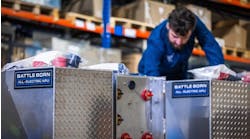The decision whether to handle vehicle maintenance in-house or to outsource some or all of that work has been a hotly debated subject across the trucking industry for years.
The topic turns up regularly at industry conferences, and in many cases, one the answer comes back that “it depends” on a number of factors.
How fleets handle vehicle maintenance was investigated as part of a recent survey conducted by Fleet Owner and Informa Engage Research - the research arm of Informa, parent company of Fleet Owner.
Among the survey respondents, 55% said they did all of their own maintenance at their own facilities, while only 13% outsourced all maintenance and repair work. About one-third (32%) said they opt for doing some maintenance work in-house and outsourcing other services.
Private fleets are more likely to do their own maintenance, with 60% of survey respondents stating that all or most maintenance is handled in-house. That compares with 40% among for-hire fleets, which are also more likely to take a “hybrid approach” to maintenance. Almost half (48%) of for-hire fleets reported using both outside services for maintenance and doing some work in-house. That compares with 28% of private fleets.
Among the 13% of survey respondents reporting that they outsource all their maintenance and repair work, for-hire carriers were somewhat more likely to choose that route than private fleets (16% vs. 12%). Of those who reported doing all their own maintenance work, most respondents were “satisfied” to “very satisfied” (95%) with their choices, but 59% felt there was still “room for improvement.”
Only a few (5%) of the respondents reported that they were “very dissatisfied” with their current maintenance operations. A slightly lower percentage of fleets that outsource some maintenance said they were “very satisfied” with their current arrangement, as compared with fleets that do all or most of their own work in-house (31% as compared to 36%).
The survey also showed there was no clear leader when it comes to type of maintenance service supplier.
Regional suppliers, vehicle leasing companies and original equipment manufacturers/dealer networks all received similar mentions (28%, 28% and 25%, respectively). In addition, fleet management companies were named by 19% of respondents.
There are a variety of factors that play into the decision to outsource or perform work in-house.
For example, long-haul fleets have a different concerns than carriers that operate locally or regionally because equipment failures can take place far away from a company-operated facility.
Similarly, while access to service may not be as much of an issue for local or regional carriers, they may find challenges with maintenance shop capacity and throughput. That can be due to not enough bays in the shop, a shortage of technicians or trouble keeping up with new training needs.
The options available to fleets, and the benefits they offer, can make it difficult to make that maintenance choice. No matter how the job gets done, however, fleets know that maintenance plays a large role in reducing cost of operation, assuring safety and compliance, optimizing productivity and helping maintain high levels of customer service.
Coming Tuesday: Fleets explain why they made the decision to handle maintenance in-house or outsource.



